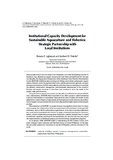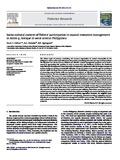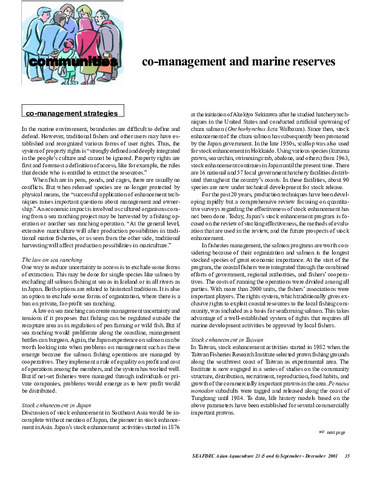Development and conservation of Philippine mangroves: institutional issues
- Global styles
- MLA
- Vancouver
- Elsevier - Harvard
- APA
- Help

View/
Date
2000Author
Page views
3,077ASFA keyword
AGROVOC keyword
Metadata
Perlihat publikasi penuh
Share
Abstract
The decline of Philippine mangroves from half a million hectares in 1918 to only 120 000 ha in 1994 may be traced to local exploitation for fuelwood and conversion to agriculture, salt beds, industry and settlements. But brackishwater pond culture, whose history is intertwined with that of mangroves, remains the major cause of loss. The paper discusses the institutional issues — aquaculture as development strategy, low economic rent of mangroves, overlapping bureaucracy and conflicting policies, corruption, weak law enforcement and lack of political will — relevant to this decline. Recommended policies are based on these institutional factors and the experiences in mangrove rehabilitation including community-based efforts and government programs such as the 1984 Central Visayas Regional Project. These recommendations include conservation of remaining mangroves, rehabilitation of degraded sites including abandoned ponds, mangrove-friendly aquaculture, community-based and integrated coastal area management, and provision of tenurial instruments.
Keywords
Aquaculture Brackishwater ponds Community-based management Integrated coastal area/zone management Tenurial/property rightsDescription
Special Issue: The Value of Wetlands: Landscape and Institutional Perspective.
Suggested Citation
Primavera, J. (2000). Development and conservation of Philippine mangroves: institutional issues. Ecological Economics , 35(1), 91-106. https://doi.org/10.1016/S0921-8009(00)00170-1
Type
ArticleISSN
0921-8009Koleksi
- Journal Articles [1261]
Related items
Showing items related by title, author, creator and subject.
-
Institutional capacity development for sustainable aquaculture and fisheries: Strategic partnership with local institutions
Agbayani, Renato F.; Toledo, Joebert D. (Terrapub, 2008)Many people living in the rural areas in the Philippines, as in other developing countries in Southeast Asia, depend on aquatic resources for their food and livelihood. For the past two decades, the Aquaculture Department ... -
Socio-cultural context of fishers’ participation in coastal resources management in Anini-y, Antique in west central Philippines
Aldon, Ma. Eva T.; Fermin, Armando C.; Agbayani, Renato F. (Elsevier, 2011)The vicious cycle of poverty, overfishing and resource degradation in coastal communities in the Philippines calls for action that will address the problem of declining fish catch and degraded fish habitats. The literature ... -
Co-management and marine reserves
Surtida, Marilyn B.; Adan, R. I. Y.; Surtida, Augusto P. (Aquaculture Department, Southeast Asian Fisheries Development Center, 2001)





